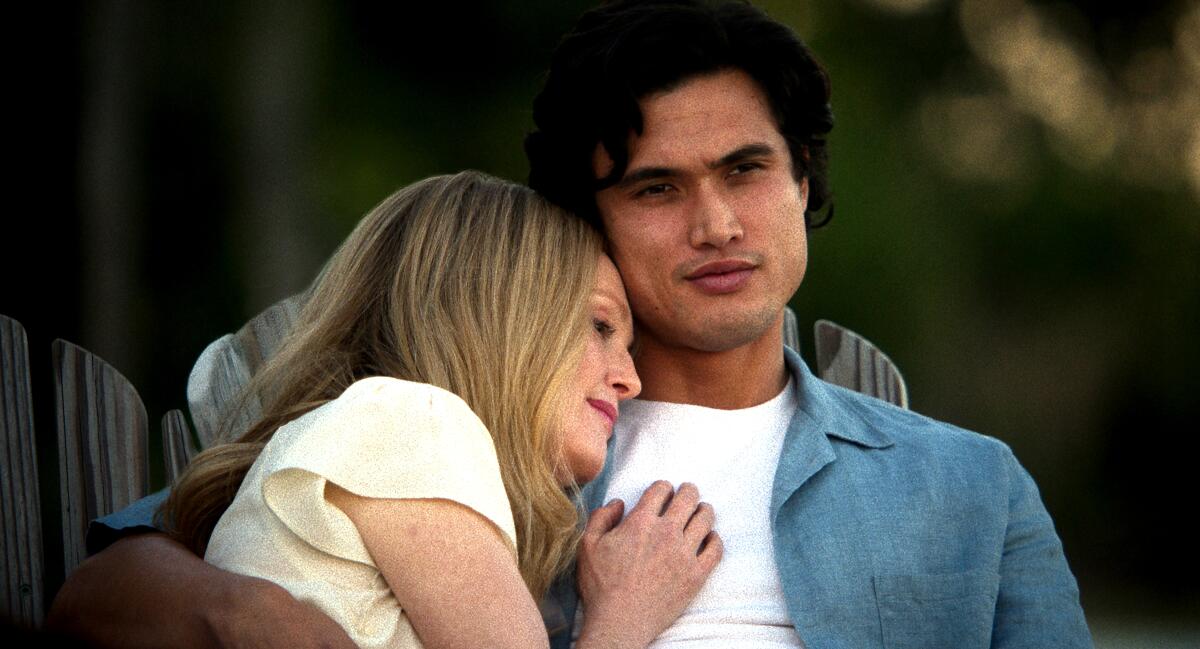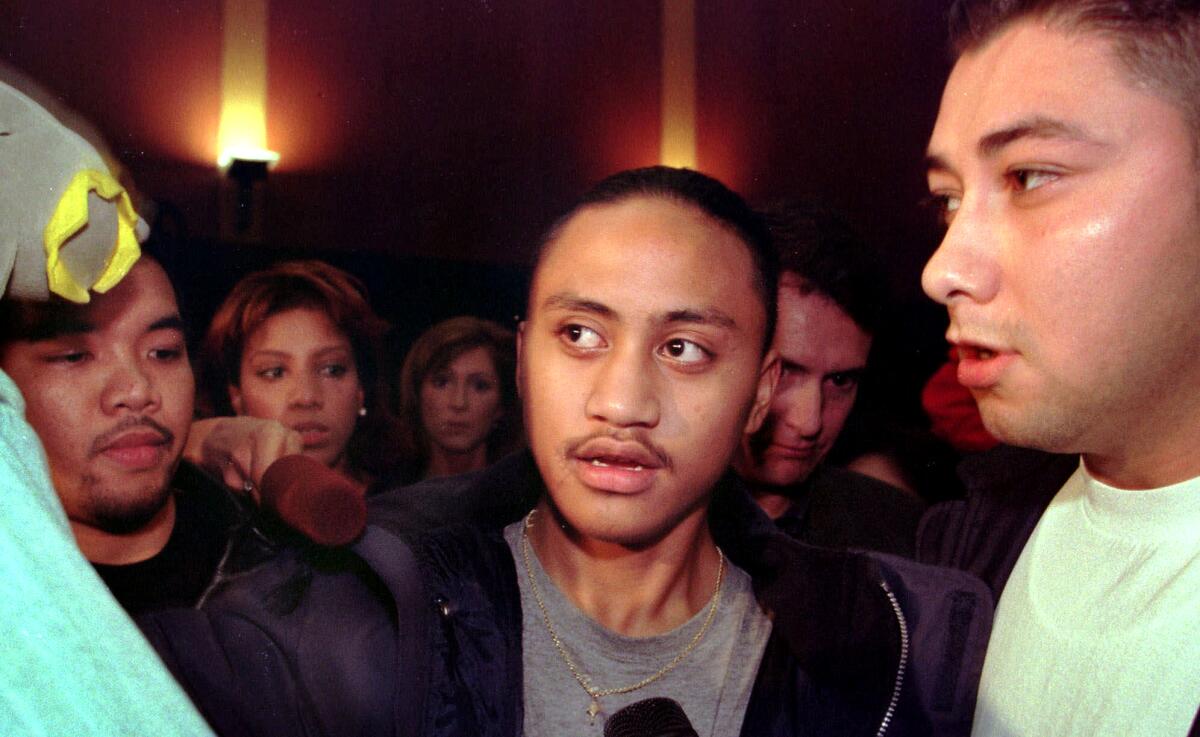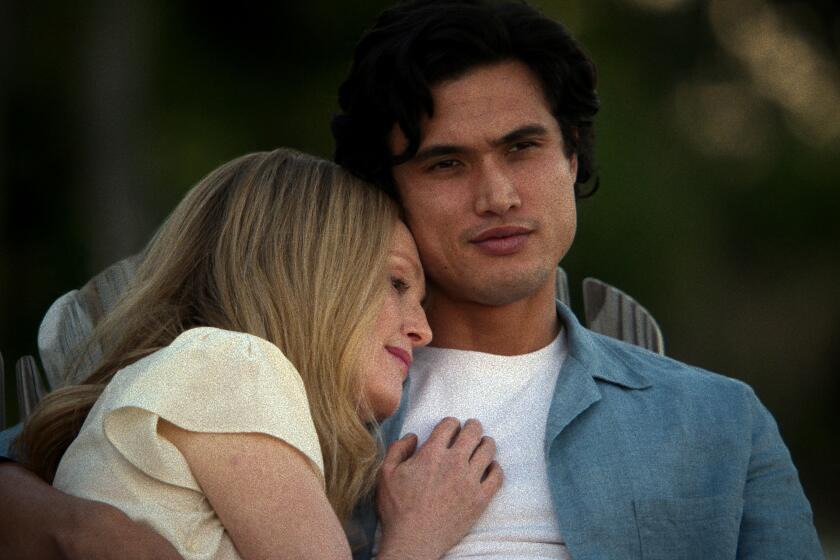Column: When it comes to Vili Fualaau, ‘May December’ wants to have its cake and eat it too

- Share via
As the critically acclaimed “May December” heads toward what will no doubt be a multiple-nomination awards season, director Todd Haynes and screenwriter Samy Burch find themselves on the receiving end of one of the questions their film asks: What do filmmakers owe the people who inspire the stories they tell, particularly when those stories involve abuse or exploitation?
“May December” follows Elizabeth (Natalie Portman), an actor, as she visits the home of Gracie (Julianne Moore) and Joe (Charles Melton), an infamous couple who began an intimate “relationship” when Gracie was in her 30s and Joe was 13. Gracie was convicted of rape and spent several years in jail, but they eventually married; they have three children, and live with as much privacy as their small town will allow. Elizabeth has been cast to play Gracie in a film and wants to spend time with them as research.
For the record:
11:25 a.m. Jan. 7, 2024An earlier version of this article said Fualaau and Letourneau were divorced.
Though certain details have been changed and the main storyline is fiction, “May December” is obviously and admittedly inspired by the headline-generating scandal of Mary Kay Letourneau, who raped and then eventually married her former sixth-grade student Vili Fualaau. Indeed, some of the dialogue was drawn directly from interviews given by the couple over the years.
This week Fualaau, who legally separated from Letourneau in 2017 but was at her side when she died in 2020, expressed unhappiness with the film, and the fact — ironically, given the film’s narrative — that no one had consulted him while making it.
“If they had reached out to me, we could have worked together on a masterpiece. Instead, they chose to do a ripoff of my original story,” he told the Hollywood Reporter. “I’m offended by the entire project and the lack of respect given to me — who lived through a real story and is still living it.”
‘May December’ offends Vili Fualaau, Mary Kay Letourneau’s former student and estranged husband, who felt disrespected when he wasn’t included in telling his story.
This is not a good look for “May December,” which Burch described in these pages as a “satire of the industry and the vampiric nature of playing real people who are alive,” but neither the filmmakers’ decision not to involve Fualaau nor his unhappiness is unusual.
When working with historical or well-publicized material, writers and filmmakers often decide that the story they want to tell will not benefit from consulting or informing those who inspired it. Even when it comes to biopics, which “May December” certainly is not.
“Maestro” may have been made with the full participation and well-publicized blessings of Leonard Bernstein’s children, but Sean Durkin, who made “The Iron Claw,” another awards contender this year, did not reach out to the surviving Von Erich brother, Kevin, until after he had written the script detailing the famous wrestling family’s story, which, for dramatic purposes, omitted one of the brothers entirely. Kevin Von Erich (played by Zac Efron in the film) has said he understands the omission but pushed back against the depiction of his father, Fritz (Holt McCallany).
Inevitably, any film or television series made about or inspired by actual events is going to make someone, somewhere, deeply unhappy.

The late, great Olivia de Havilland famously sued, at age 100, Ryan Murphy for his profane and gossipy depiction of her in “Feud: Bette and Joan.” Football star Michael Oher, who earlier this year accused the Tuohy family of cutting him out of money earned by their participation in “The Blind Side,” took issue early on with the film’s depiction of him as “dumb.” Amanda Knox has repeatedly called out cinematic versions of her story — she was wrongly convicted of murder in Italy and imprisoned for four years before being exonerated — particularly the Matt Damon-starring film “Stillwater,” in which the Knox-inspired lead was actually guilty.
More recently, almost every living historical figure depicted in HBO’s “Winning Time: The Rise of the Lakers Dynasty” disparaged its accuracy, and friends and supporters of the British royal family recently pressured Netflix to add a “this is a fictionalized dramatization” disclaimer to “The Crown.”
De Havilland lost her suit (and her attempt to take it to the Supreme Court); laws regarding free speech offer wide protections to fiction and fictionalized accounts, with good reason — without an acceptance of literary license, some of the best, most powerful films, series and novels would not exist.
But if writers and directors do not have a legal obligation to the public figures at the center of their stories, do they have a moral one? Not every public-figure inspiration is created equal; there is a difference between the queen of England and a man who is known for marrying the woman who raped him when he was a child.
In recent years, there has been a growing awareness of the effect that true crime stories, however fictionalized, can have on the people involved. For instance, films coming off #MeToo have stressed the importance of respecting survivors’ experiences, and Ryan Murphy’s “Dahmer — Monster: The Jeffrey Dahmer Story” was criticized for re-traumatizing the families of Dahmers victims.
No one would compare “May December” with “Dahmer” or even “Stillwater” — as Haynes and Burch have said repeatedly, the Letourneau/Fualaau relationship was a springboard, not a blueprint — but there is no reading of that story, from the initial crime to the subsequent salacious publicity around their eventual marriage, in which Fualaau is not a victim. No matter how sincere and fine a re-imagining of his life might be, the decision not to involve him in some way is, at the very least, troubling.
The director of “Carol” discusses his latest film, its connection to the Mary Kay Letourneau scandal, working with Julianne Moore and his career to date.
Especially since the film directly addresses the exploitation of Hollywood adaptations. In “May December,” Elizabeth’s encounters with Joe seem to offer, at first, hope of deliverance. She sees what the young man, still very much in thrall to Grace, does not: that the “relationship” began when Joe was too young to consent to it and continued when he was still too young to understand what it would cost him.
But Elizabeth uses Joe as well — her “research” extends to having sex with him and then all but shoving him out the door. As far as the Elizabeth character, rich with “creative-process” narcissism, embodies Hollywood, “May December” portrays our thirst for retelling sensational events as destructive. Glimpsed at the end, the film Elizabeth is working on appears far from high art, adding insult to injury.
The power of “May December” comes from Grace and Elizabeth’s relentless battle for, if not truth, then narrative control. Indeed, the only “good” major character in the film is Joe, who is depicted, tragically, as something of a hapless bystander in his own life.
Which, given the decision not to involve Fualaau, feels uncomfortably as if the filmmakers were trying to have their cake and eat it too.
Yes, the people who inspire “based on real events” films and series we love are often unhappy with the cinematic results. But, as with the renewed discomfort over “The Blind Side,” Fualaau’s words feel more poignant, and important, than, say, Magic Johnson refusing to watch “Winning Time” or Judi Dench protesting the inaccuracies of “The Crown.”
Unlike the Lakers or the royal family or Olivia de Havilland, Fualaau is not a public figure beyond the one thing the world knows about him; like Knox and, to a lesser extent, Oher, he was pushed into the public eye when he was young, vulnerable and a victim of circumstance, which in Fualaau’s case meant the victim of a crime.

There is, as Knox recently pointed out in a lengthy social media thread reacting to Fualaau’s comments, no legal way for public figures to control the way they are used in fiction. Again, for very good reason. Writers and artists use familiar figures as cultural touchstones to tell all sorts of stories, many of which have little to do with the actual people or events that inspired them, and audiences are expected, reasonably, to understand this.
Some of these stories will be good, some bad, a few great; historians will make lists of corrections, critics will express outrage or appreciation, and we can all discuss the complicated nature of fact, fiction, myth, memory and storytelling, which is always a good thing.
But sometimes, it is worth remembering that at the center of those touchstones are real people who, often through no intention of their own, watched helplessly as their stories became public domain.
This is one of those times.












